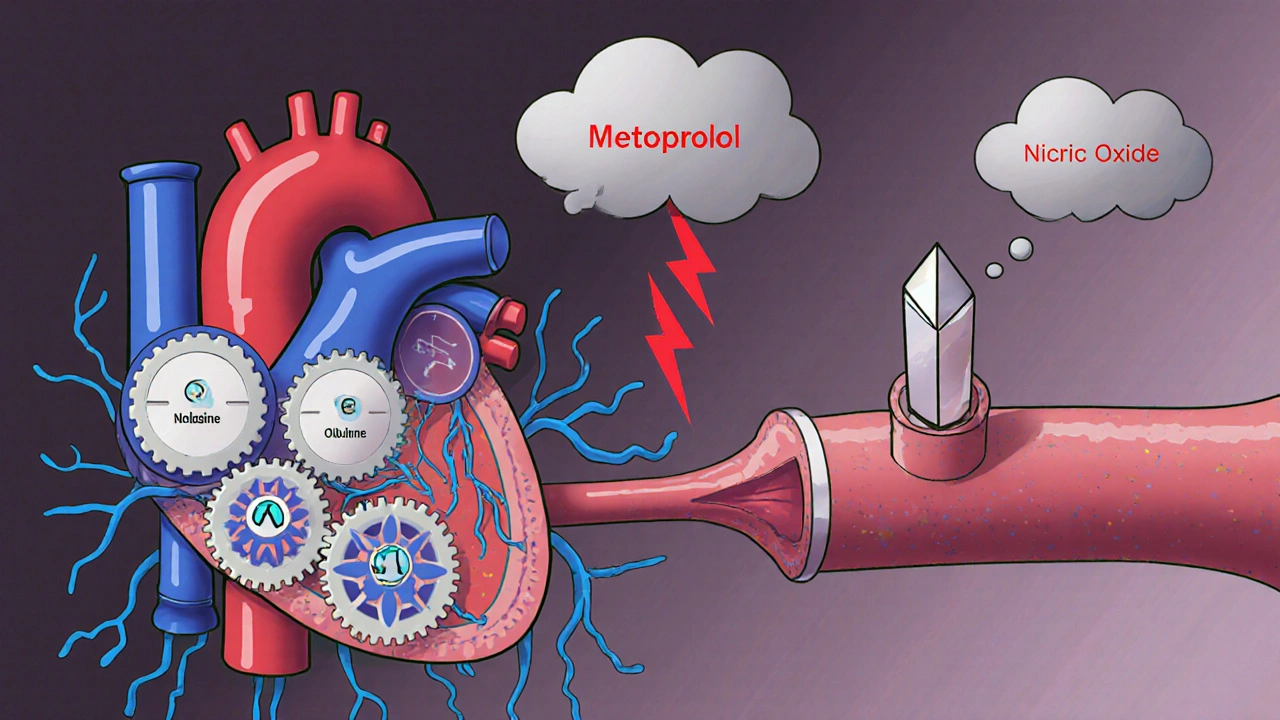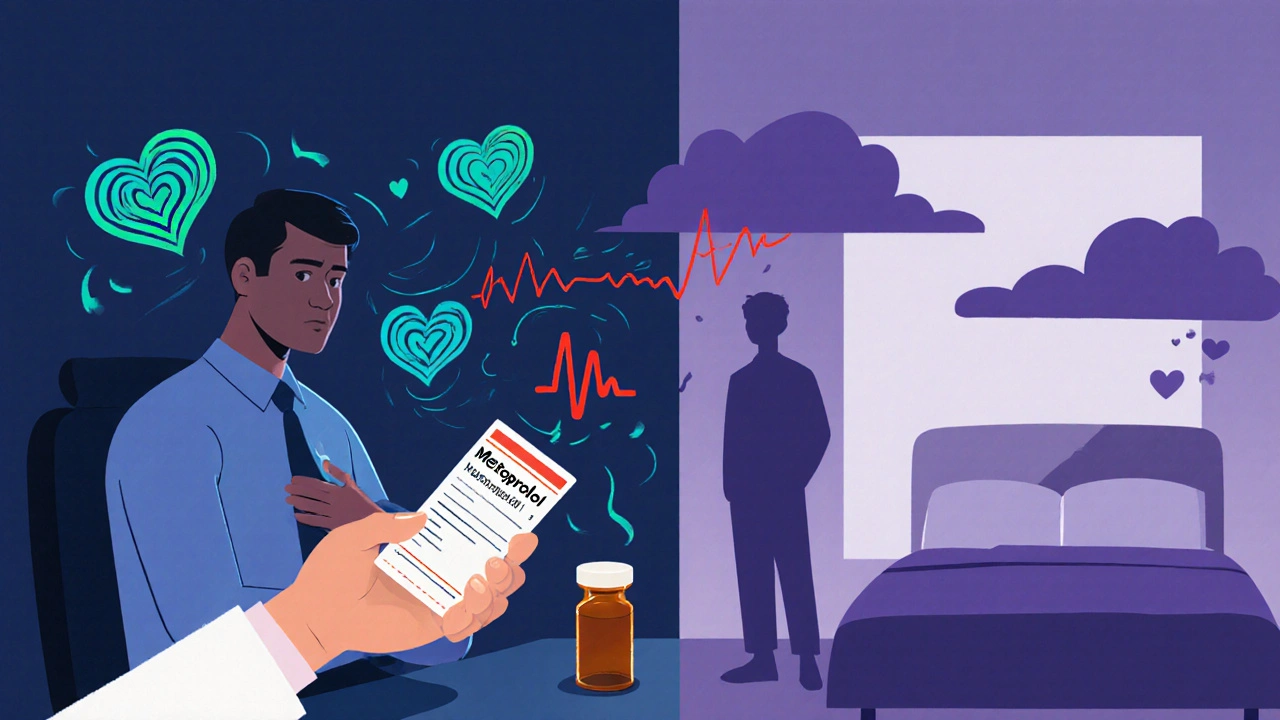When a doctor prescribes Metoprolol a beta‑blocker used to lower blood pressure and treat heart rhythm problems, most men expect fewer heart attacks, not a change in bedroom performance. Yet a surprising number of patients report a dip in sexual confidence after starting the drug. If you’ve noticed that, you’re not alone, and the good news is there are clear steps you can take.
What is Metoprolol?
Metoprolol belongs to the beta‑blocker class and works by slowing the heart’s response to adrenaline. The medication comes in two main forms: metoprolol tartrate (short‑acting) and metoprolol succinate (extended‑release). Doctors choose it for conditions like hypertension, angina, and after‑heart‑attack management.
How Metoprolol Lowers Blood Pressure
By blocking the beta‑1 receptors in the heart, metoprolol reduces heart rate and the force of each beat. This leads to less demand on the arteries, which in turn lowers the overall pressure. The drug also dampens the release of renin, a hormone that can tighten blood vessels. The result is a calmer cardiovascular system that’s less likely to experience dangerous spikes.
Common Side Effects (Beyond the Bedroom)
- Fatigue or feeling unusually sleepy
- Dizziness, especially when standing up quickly
- Cold hands and feet
- Brief episodes of shortness of breath
- Weight gain or mild swelling
These issues are usually mild and fade as your body adjusts, but they’re worth tracking because they can hint at how the drug is interacting with other systems.
What Exactly Is Erectile Dysfunction?
Erectile Dysfunction is the persistent inability to achieve or maintain an erection sufficient for sexual activity. It’s a medical condition, not a moral failing, and can stem from physical, psychological, or a mix of factors. Hormone levels, blood flow, nerve health, and mental stress all play a part.
Why Beta‑Blockers Can Impact Sexual Function
Beta‑blockers like metoprolol affect more than just the heart. They can also influence the nerves that trigger an erection and the vascular system that supplies blood to the penis. The main mechanisms are:
- Reduced sympathetic drive - By calming the “fight‑or‑flight” response, the drug can lower the natural surge of adrenaline that helps start the erection process.
- Interference with Nitric oxide a molecule that relaxes smooth muscle in the penile arteries, making it harder for blood to flow in.
- Potential decline in Testosterone the primary male sex hormone levels, especially when high doses are used.
These effects are subtle for many men, but they can add up, leading to the dreaded erectile dysfunction you might be experiencing.
What the Research Says
Several studies over the past decade have examined the link between beta‑blockers and sexual health. A 2022 meta‑analysis of 18 trials found that men on non‑selective beta‑blockers reported a 12% higher incidence of ED compared with those on ACE inhibitors. Metoprolol, being a selective beta‑1 blocker, showed a slightly lower risk-about 7% higher than placebo-but the difference was still statistically significant.
Another 2023 observational study of 4,500 hypertensive patients noted that 22% of men on metoprolol reported new‑onset ED within six months, versus 14% on calcium‑channel blockers. Importantly, the risk rose with higher daily doses and when the drug was combined with thiazide diuretics.

Managing the Risk: Practical Steps
- Track symptoms. Keep a simple log of blood pressure readings, energy levels, and any changes in sexual performance. Patterns will help your doctor adjust treatment.
- Review dosage. Sometimes a modest reduction (e.g., from 100 mg to 50 mg daily) maintains heart protection while easing side effects.
- Consider timing. Taking metoprolol at night can lessen daytime fatigue and may improve spontaneous erections.
- Explore adjunct therapies. Phosphodiesterase‑5 inhibitors (like sildenafil) are safe for most men on beta‑blockers, but they require doctor approval.
- Lifestyle tweaks. Regular moderate exercise, a balanced Mediterranean‑style diet, and stress‑reduction techniques boost both cardiovascular and sexual health.
When to Talk to Your Doctor
If you notice any of the following, schedule a check‑up:
- Persistent difficulty achieving an erection lasting more than a few weeks.
- Sudden drop in libido accompanied by mood changes.
- New or worsening fatigue that interferes with daily tasks.
- Any side effect that feels severe or unsafe.
Your physician may switch you to a different class of antihypertensive, adjust the metoprolol dose, or add a medication to counteract the sexual side effects.
Alternative Blood‑Pressure Drugs With Lower ED Risk
| Medication Class | Typical Dose | Reported ED Incidence* | Notes |
|---|---|---|---|
| Selective beta‑1 blocker (Metoprolol) | 50‑100 mg daily | 7‑12% | Effective for heart‑rate control; risk rises with higher doses |
| Calcium‑channel blocker (Amlodipine) | 5‑10 mg daily | 4‑6% | Often well‑tolerated; can cause peripheral edema |
| ACE inhibitor (Lisinopril) | 10‑40 mg daily | 2‑4% | Low sexual side‑effect profile; watch for cough |
| ARB (Losartan) | 50‑100 mg daily | 2‑3% | Similar to ACE inhibitors but fewer cough complaints |
*Incidence rates are averages from peer‑reviewed studies and may vary by population.
Living Well While on Metoprolol
Sexual health isn’t an all‑or‑nothing scenario. Even if you stay on metoprolol, you can take proactive steps:
- Stay active - at least 150 minutes of moderate cardio each week improves blood flow.
- Eat foods rich in L‑arginine (nuts, seeds, lean meats) to naturally support nitric oxide production.
- Maintain a healthy weight - excess fat can lower testosterone and increase ED risk.
- Prioritize sleep - quality rest regulates hormones and reduces stress.
- Communicate with your partner - openness reduces performance anxiety, which itself can trigger ED.
Quick Checklist
- Monitor any change in erection quality after starting metoprolol.
- Log blood pressure and dose adjustments.
- Discuss side‑effects with your doctor before stopping medication.
- Consider alternative antihypertensives if ED persists.
- Adopt heart‑healthy lifestyle habits to support both cardiovascular and sexual function.
Can metoprolol cause permanent erectile dysfunction?
Most men experience a reversible effect. Adjusting the dose or switching medication usually restores normal function. Permanent damage is rare and often linked to underlying heart disease rather than the drug itself.
Is it safe to take Viagra while on metoprolol?
Yes, in most cases. Sildenafil does not interact directly with beta‑blockers, but you should still get a doctor’s OK, especially if you have heart disease.
How long does it take for sexual function to improve after changing medication?
Most men notice improvement within 2-4 weeks after the new drug reaches steady‑state levels. Full recovery can take up to three months, depending on how long the side effect persisted.
Are there natural supplements that help counteract metoprolol‑related ED?
Ingredients like L‑arginine, panax ginseng, and yohimbine have modest evidence for boosting nitric oxide or blood flow. Always check with your doctor before adding them, as they can affect blood pressure.
Should I stop metoprolol if I develop erectile problems?
Never stop abruptly. Sudden withdrawal can trigger heart‑rate spikes and increase the risk of a heart attack. Discuss dose tapering or an alternative drug with your clinician.


the sagar
Metoprolol messes with men’s drive, the pharma lobby hides it.
Grace Silver
It’s fascinating how a heart drug can whisper doubts into the bedroom mind you see the body is a delicate system and sometimes our medicines tilt the balance we tend to overlook the subtle shifts
Clinton Papenfus
One must consider the pharmacodynamic profile of metoprolol; its beta‑1 selectivity mitigates some vascular effects yet the central nervous system may still feel the dampening influence on libido.
Zaria Williams
Okay so i read the whole thing about metoprolol and ed and here’s the deal you get your blood pressure down but suddenly you feel like a rusty old bike that cant even start the chain on a cold morning *sigh* first off the fatigue is real its like you slept for 12 hours and still feel tired then there’s the cold hands thing you know you’re not a polar bear but your fingers feel like ice cubes in a freezer the dizziness when you stand up quick? Yeah that’s legit vertigo in the making and the weight gain part is like a silent sneaky extra layer of sweater you never asked for
Now about the bedroom – the drug is a beta‑blocker so it tones down the adrenaline surge that usually helps you get going and also may mess with nitric oxide pathways which are key for blood flow to the penis i’ve heard some docs say lower testosterone at higher doses but the evidence is mixed the studies quoted show a 7‑12% bump in ed cases compared to placebo which isn’t huge but noticeable for many guys the risk seems to rise when you stack it with thiazides also metoprolol isn’t the only culprit there are other meds like lisinopril that have lower ed rates but they have their own side effects like cough
Practical tip #1 keep a simple log of your bp readings energy and any changes in erection quality this helps the doc see patterns #2 talk to your doctor before you decide to ditch the med because sudden stop can cause heart spikes #3 timing the dose at night might shave off daytime fatigue, some guys swear by it #4 if the ed sticks, sildenafil is usually safe but get the green light first #5 lifestyle – exercise, med diet, stress control – all of that boosts circulation and hormones
Bottom line – don’t panic, it’s often reversible, adjust the dose or switch drugs and you’ll likely get back on track.
Melanie Vargas
Hey folks 😊 remember you’re not alone in this. Tracking symptoms can feel like a chore but it’s super empowering. If you notice changes, bring them up – your doctor wants to help. And hey, a little humor never hurts 😄
Ken Dany Poquiz Bocanegra
Keeping an eye on dosage can make a big difference; a small tweak often eases side effects while still protecting the heart.
Terell Moore
Ah, the age‑old romance between beta‑blockers and bedroom performance – truly a masterpiece of modern pharmacology. One might even argue it’s the pharmaceutical industry’s subtle art of balancing life and… lack thereof.
Amber Lintner
So you’re telling me a heart pill can kill the spark? Absolutely not! I’ve known men who take metoprolol and still rock the sheets like it’s a rock concert. Maybe it’s all in your head.
Lennox Anoff
It is a moral imperative to prioritize genuine health over pharmaceutical convenience. One should not accept a drug that compromises natural vitality, especially when alternatives exist.
Bianca Larasati
Rise above the shadow of side effects! Harness the power of movement and nutrition to reclaimed vitality – you deserve a life that throbs with energy.
Corrine Johnson
Seriously, the data-yes, the data!-shows a statistically‑significant increase in erectile dysfunction incidence; however, one must consider confounding variables, dosage thresholds, and, importantly, individual physiological responses!!!
Jennifer Stubbs
From an analytical standpoint, the risk‑benefit ratio of metoprolol remains favorable for most patients, provided clinicians monitor sexual side effects and adjust therapy accordingly.